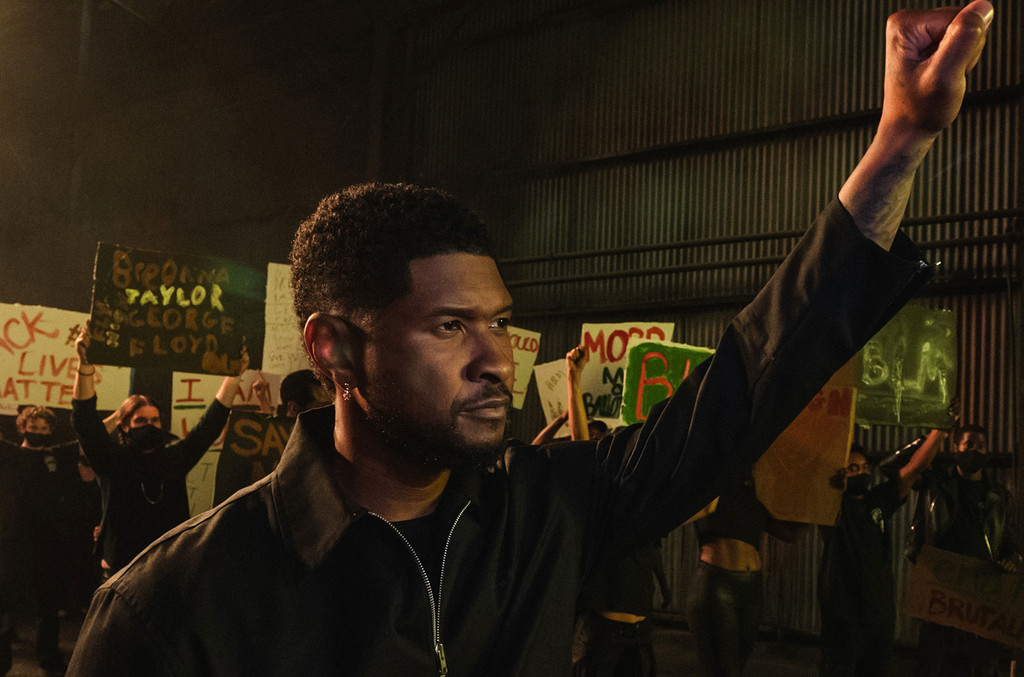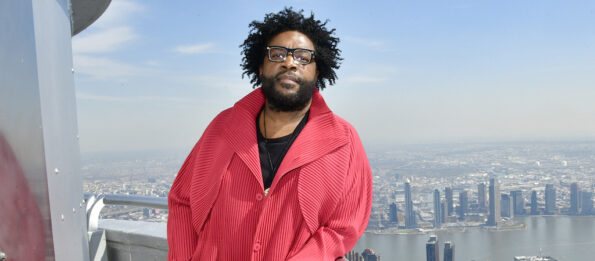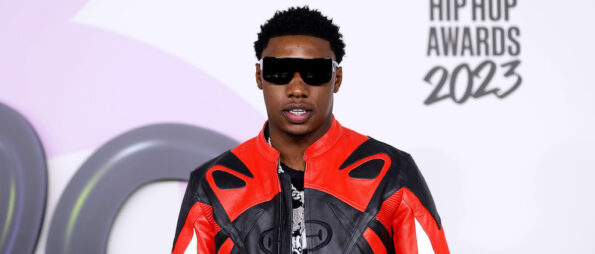As cries of racial injustice continue to reverberate throughout America, Usher is hoping to provoke change in a myriad of ways. After protesting alongside Trey Songz earlier this month and penning an op-ed for The Washington Post highlighting the importance of Juneteenth, on Friday (June 26), Usher skated back to his domain — the studio — and doled out his gripping new track, “I Cry.”
His latest record is a riveting display of vulnerability and compassion for those harboring pain at the expense of prejudice and inequality, especially under police brutality. The song’s hook is poignant, relaying a message of empathy to the sons without fathers and mothers entrenched in heartache.
Usher will perform his new record this coming Saturday (June 27) during Global Citizen’s TV Special Global Goal: Unite For Our Future. Along with his performance, proceeds from “I Cry” will go toward the Local Initiatives Support Corporation, a non-profit organization designed to help Black and minority small business owners affected by the economic spiral caused by the COVID-19 pandemic.
Read Billboard‘s exclusive interview with Usher as he provides a deep dive into his powerful new song.
The opening lines for “I Cry” goes as follows: “I can’t keep it together / I usually don’t show my emotions/ But it ain’t getting better / ‘Cause you can’t be blind with eyes wide open.” When did you reach your breaking point emotionally during this fight for change?
Hmm. I think it started before we were here. I think as you grow older, you become more empathetic and understanding of the world’s problems. Maybe it is the fact that you do have the ability to be able to give some perspective, right? When you have managed to have been successful or have some idea of success. I don’t know if it was more of a philanthropic thing that started it because I mentor the youth through New Look Foundation, but all of those things sparked some idea of empathy that led to becoming more conscious of what’s going on in the world around me.
If you take a bird’s eye view of it all, you look at the most visible part, which is the peak of the mountain. But then, when you go deeper and you understand that all of these things are systemic, you begin to think, ‘ How can I begin to influence that change? Should I mentor youth? Should I talk about it on the platform that I have? I think all of it together is just thinking about what it is to be able to say I can reap the benefits of the hard work that advocates far before I even was born were doing.
If you go back to Paul Roberson and the beginning of how he began to advocate for African Americans in America, or you fast forward and you go up to Malcolm X or you go to Martin Luther King Jr., the advocacy runs deeper than any one person can even convey, but the most important part is to educate yourself. I think the more I educated myself about my history, the more I began to become empathetic, and I found ways to begin to talk about it in my music.
I did this song called “Chains” a long time ago in wake of what was going on in our system, and just the nature of how police officers were not being accountable for their acts behind their badges, as well as vigilantes that took liberty into their own hands to take the lives of innocent people. Later on, we would find that the system was kind of working against us. So I began to write songs in that way many years ago with a song called “Chains.”
Fast forwarding to today, the awakening came as a result of me being able to say, “Life is a little bit easier for me as a result of hard work and the tenacity of people who wanted to change and really see equality in America.” I began to think, and I said, “Let me educate myself on where it came from. What is the source of this change and its ability to be able to have some influence on how people perceive what the African American experience is?”
No matter how successful you are, you still have to understand that someone, somewhere, is still experiencing this unjust reality, and it became more vivid when we all had a moment to be home. I think the pandemic gave us an awakening that we needed, because we were able to bring all of those emotions. All of those emotions began to surface as a result of being able to look at what’s going on in the world.
I think the vivid video of an officer taking the life of George Floyd made everybody feel something. It didn’t matter what color you were. On Zoom conversations, I could feel it. I could feel the tension. I could feel white people saying, “Man, what can I do to adjust this reality that I know is there, but maybe I didn’t have to look at it before. Now I can see it and it’s very loud.” At that moment, that’s when I began to understand, “Man, I can’t literally do no more than actually feel and the emotion of just feeling, is more important than anything because that means I want to see something change. I want to use what I can to bring about the change that needs to happen in America and in the world.”
How are you mentally balancing being a Black man, being a Black parent, and being a Black public figure in the midst of pandemic and fighting for equality?
I think change starts with you. With each individual, it’s how you feel about it, whether you choose to make yourself uncomfortable, to be able to help the progress of equality in America. It could be very easy for me to disregard and say, “Those are not my problems. I’ll just stay out of it and I’ll just leave it as is and hopefully, justice will prevail,” but I think it starts with each individual person.
As a Black man, as a father, as an artist using my platform, to be able to find something that makes other people clear on what’s going on as music marks our history. When you think of every experience that has ever happened, there’s probably a song that could have gone with it. Maybe it spoke specifically to what was going on in that time. Maybe it spoke to an emotional feeling that you experienced at one point in your life, but I chose to allow this song to be inspired by me wanting to teach people — more than anything myself, my sons — that it’s OK for us to feel emotions and actually cry, man.
I was raised to believe that you gotta be tough, and to show vulnerability is perceived as a negative, specifically for a Black man because strength is all that you have. Pride is all that you have, because equality isn’t something that’s a part of your history and the fight for equality is the thing. I don’t want to teach the negative, I want to teach the part that’s going to make you think. I want to teach that to my sons that it’s OK to be vulnerable and to know the difference between weakness and empathy. Just because you feel something doesn’t mean you’re weak. To empathize begins to give you passion that is about something greater than just your own self, your own comfort.
While I think everybody is kind of locked in during this pandemic and watching the ongoing slaughtering of Black men and women, then you begin to look at all of the other people who over the last four, five years have been experiencing this thing. And then the protesting of men, athletes and those little things just unfolded so clear in front of America’s eyes with what’s going on. I just became very connected in a very universal way. Universally, I felt a sense of hopelessness and that’s what that song [ “I Cry” ] began to make me feel. I had to get it out.
So as I grow more frustrated with the process of how slow change is, I don’t want to become fatigued because I think a lot of times people do. Then they get preoccupied and go back into their regiment of what is normal. They go back to, “OK. I gave enough time to that and now I need to go back to my normal, chill struggle,” but everybody is struggling right now. I think if anything, [this current time] marks a piece of history. It wasn’t about me. I felt it, but I think I felt it as a result of the world feeling it. So as an articulator in music, I wanted to convey that. I wanted people to know that you’re not alone. I feel your pain, too.
The reality of what’s going on in the world with the senseless deaths, I wish it can be considered murder, but on many cases, it hasn’t. It’s just been considered as “Oh well. It’s the officer of the law enforcing the authority he had as a result of a badge.” An innocent man’s life was taken. So, for the son now who doesn’t have a father as a result of that and the pain the mother of that child feels, it’s hopeless, but I want to let you know that I’m crying with you. And that cry? That tear? It’s not going to stop. I’m going to be loud. I’m crying in this moment and I’m crying out for you to change this. The cry doesn’t stop this time. Everybody feels pain. So I cry with you. When I say “These tears won’t run dry this time, no, we have to change this together,” we do this individually, one at a time, all coming together to change it.
On the hook, you sing about “crying for the sons without fathers and the pain the mothers hold deep inside.” Besides learning to be vulnerable, as a parent, what other conversations are you having with your kids right now?
There was this book that Ta-Nehisi Coates wrote [Between The World & Me]… I’m living out that conversation with my sons. As you try and explain the explicit history of America, it’s very complicated, but if America and those in power can put down their pride for one moment and be able to hear this cry and begin to find the ways to get closer to equality, then maybe things can change.
But I talk to my kids about the reality of their history and I don’t just talk about the negative parts, I talk about the good things that happened and the idea of why it happened and why people advocated. Ta-Nehisi Coates basically put it as: your world is right there with you with your sons. This is the world that we live in, but we can change it. So please know how you looked during this time. Please know how they see you. Please know the history that is not changing slowly. There’s a time when governance in body begins to change laws. If you can climb that ladder and begin to chip away at that piece that brings some hope and reality for change, maybe those in power will feel compelled to change it.
You’ll be debuting “I Cry” during Global Citizens TV special on Saturday. What are you hoping people take away from this song’s performance and message?
I hope they know that they’re not alone. If you chose to put yourself on the front lines of protests, if you chose to put yourself on the front lines by way of posting something or reposting something, know that you’re not alone and we can change this. Just know that you’re not alone and that we’re together in this fight.
I hope that the entire world, Black Americans and those who are Black in other countries, those who receive prejudice or injustice, know that they’re not alone. We’re steady fighting for this. I’m fighting for the reality. If Dr. King and all of the people who have become motivators for me had a dream, I’m now fighting for the reality. I want to see it. I want it in real time. I want to go as far as I possibly can to help the entire world fix it.
With everything that you are doing, do you ever find yourself questioning whether you’re doing enough, especially since this is going to be a long, arduous battle?
Yeah. Am I doing what I can is what I say to myself. I’m going to do what I can and I only ask that you do what you can. If you felt something through this song, I ask that you do what you can. We’re all trying to figure this thing out. We’re all humans. We all have a first shot at trying to get this right and sometimes, like I said, history may show us that there has been wrong, but we can fix that wrong by at least feeling for each other.
If those in power can put their pride for a minute and allow themselves to say, “OK, it was written, I’ll just abide by what was written,” then you can have two moments of empathy and begin to understand that maybe we can truly have equality. As I tell my children and I don’t know if I picked this up during my conversations with Harry Belfonte or Claude Anderson and the conversation we had about changing systemic racism in America through economics, which is why I decided to work along with LISC because they do support Black and minority owners of small businesses, but the reality is one person at a time we can change this. We all have to actively do it. I can’t make you do it. I can hopefully make you feel something that will then give you the ability to fix it or at least address it and recognize it from where you stand. All the proceeds that will come to me for this song, will go on and try to help this initiative.
I want to say that Global Citizens’ initiative is very specific around COVID-19. For me, I wanted to recognize not only the reality of that, but also in the underserved communities for African Americans, those are the ones that are being hit hardest. So I wanted to be able to offer these funds for them whether it’s giving them the medication they need, or even if it’s the support that they need for their businesses, I feel like that was the best to be able to offer something. But I do what I can and I hope that you can as well.



